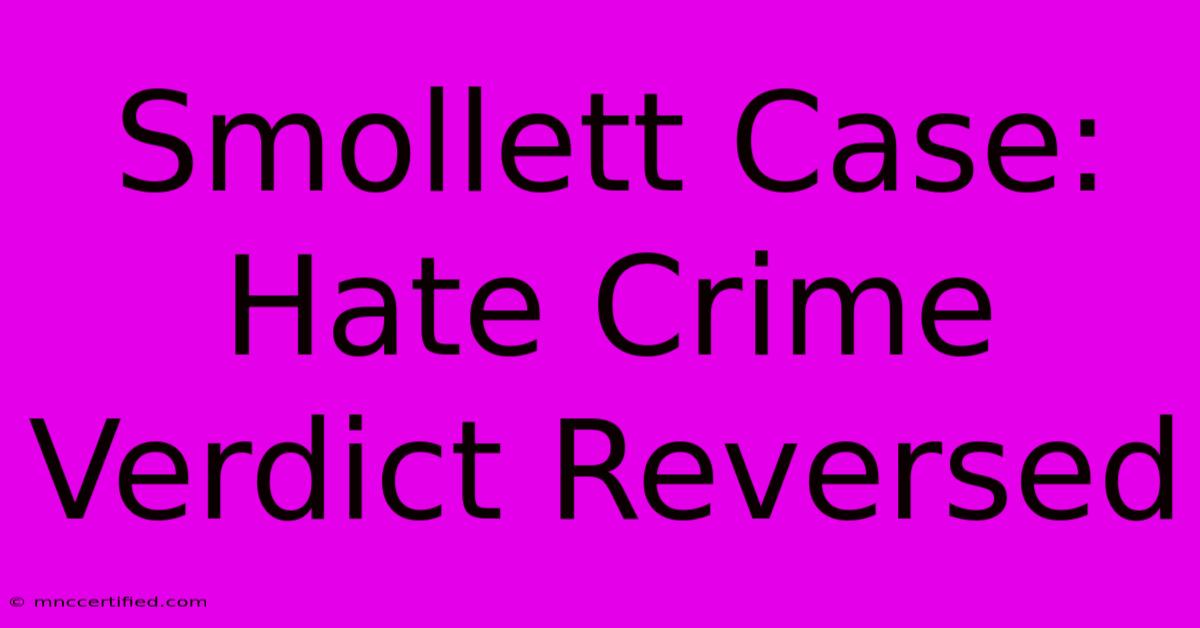Smollett Case: Hate Crime Verdict Reversed

Table of Contents
Smollett Case: Hate Crime Verdict Reversed – A Deeper Dive into the Controversy
The case of Jussie Smollett, the actor accused of staging a hate crime against himself, has captivated the nation and sparked intense debate. After a highly publicized trial, his initial conviction was overturned, leaving many with lingering questions and fueling ongoing discussions about justice, race, and media representation. This article delves into the details of the case, the reasons behind the verdict reversal, and the broader implications of this controversial saga.
The Original Allegations and Trial
In January 2019, Smollett, then a star on the television show Empire, reported to Chicago police that he had been the victim of a hate crime. He claimed two masked men had attacked him, shouting racial and homophobic slurs, and pouring a chemical substance on him. This account ignited immediate outrage and widespread condemnation.
The ensuing investigation, however, revealed inconsistencies in Smollett's story. Evidence emerged suggesting he had orchestrated the entire event with two brothers, Abimbola and Olabinjo Osundairo, who were subsequently arrested and charged as accomplices. Smollett was eventually charged with disorderly conduct for filing a false police report, a felony. He was found guilty and sentenced to 150 days in jail, along with probation and community service.
The Reversal: Why the Verdict Was Overturned
The seemingly clear-cut conviction took a dramatic turn when an appellate court reversed the verdict. The court's decision hinged on a procedural issue: the dismissal of a special prosecutor. The argument centered around the fact that the judge overseeing Smollett's trial lacked the authority to appoint a special prosecutor, as this power rests with the Cook County State's Attorney. The appellate court ruled that this procedural error violated Smollett's Sixth Amendment right to a fair trial.
This reversal does not necessarily declare Smollett innocent of the underlying charges. Rather, it highlights a critical procedural flaw that invalidated the entire process. The ruling focuses on the legality of the prosecution, not the guilt or innocence of Smollett himself.
The Implications of the Ruling
The reversal of Smollett's conviction has significant ramifications, extending beyond the specifics of his case. It underscores the importance of adhering strictly to legal procedure, even in high-profile cases that generate intense public scrutiny. Any perceived deviation from due process, however minor, can have profound consequences.
The case also reignites the conversation surrounding the reporting and handling of hate crimes. While Smollett's actions undoubtedly undermined the credibility of genuine victims, the debate about the impact of false accusations on public trust in law enforcement and the justice system remains a vital concern.
The Ongoing Debate and Public Perception
The Smollett case continues to spark passionate debate on social media and within the broader public. Many feel the reversal demonstrates a failure of the justice system, while others argue it reinforces the importance of procedural due process.
The case has also fueled discussions about race, sexuality, and media representation. Some argue Smollett’s actions played into harmful stereotypes and damaged the cause of social justice. Others maintain a focus on the systemic issues surrounding race and justice.
Conclusion: A Complex Legacy
The reversal of Jussie Smollett's hate crime conviction leaves a complex legacy. While the procedural error that led to the reversal is undeniable, the ethical and societal questions raised by his actions remain unanswered. The case highlights the need for both rigorous investigation and strict adherence to legal procedure in all cases, regardless of public pressure or media attention. The ongoing debate around the Smollett case underscores the intricacies of the justice system and the lasting impact of high-profile controversies on public perception and discourse. Further legal proceedings may still be possible, adding another layer of complexity to this already multifaceted case.

Thank you for visiting our website wich cover about Smollett Case: Hate Crime Verdict Reversed. We hope the information provided has been useful to you. Feel free to contact us if you have any questions or need further assistance. See you next time and dont miss to bookmark.
Featured Posts
-
Icc Arrest Warrants Israel Hamas Leaders
Nov 22, 2024
-
Actor Jude Law A Star Wars Fan
Nov 22, 2024
-
Car Insurance Quotes Santa Clara
Nov 22, 2024
-
Auto Insurance Premium Financing
Nov 22, 2024
-
Shelter Insurance Springfield Ky
Nov 22, 2024